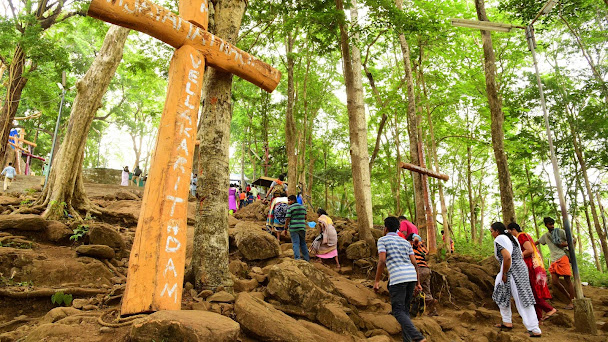Poonthanam Illam: Story of a great Poet
This simple heritage house in the sleepy town of Keezhattur close to Perinthalmanna is the place where the most revered Malayalam poet Poonthanam Nambuthiri lived his life. The actual name of the poet is not available but the name of his family became the signature of his work. The house is said to have been built around 600 years ago but still stands to recite the story of the most loved devotee of Lord Guruvayoorapan.
Born
in the 16th century, Poonthanam wrote his poems in Malayalam
different from all his contemporaries who wrote in Sanskrit. This way of
writing was to make all understand the poems & recite it during the worship
of Lord Krishna. The literary style used by Poonthanam is called Pana
which is a use of simple words in Malayalam. His greatest work is the Jnanapana
& there is a story of competition with another great poet of the time -
Melpathur Narayana Battathiri. It so happened that once the Jnanapana was
finished, he wanted Melpathur to recite it & suggest corrections. Melpathur
who wrote in Sanskrit considered this request of Poonthanam inappropriate as he
considered Malayalam to be inferior to Sanskrit in literature. His refusal made
Poonthanam sad but he took the rejection in humility & hoped
Guruvayoorappan would like his work. It is said that Guruvayoorappan came in
front of both and accepted Jnanapana over Melpathur’s work stating he preferred
the bhakti (devotion) over the vibhakti (literary prowess) of Melpathur.
The relation of Lord Krishna, Poonthanam & the Guruvayoor temple is a medium for many stories. One such story is related to his personal sorrow. Poonthanam married young but was childless for long & prayed to the Lord for a child. Guruvayoorappan, happy with their devotion, blessed him with a son but tragically the child died within days. Poonthanam was grief-stricken but again took refuge in the devotion of the Lord. It is said that Lord Krishna came to him, placed His head on Poonthanam’s lap & asked him to consider Himself as his child. This was a moment of great joy for Poonthanam who kept reciting the Bhagwatham for the rest of his life singing praise for the Lord.
Another
story that connects Poonthanam with Lord Guruvayoorapan is the relation of a
devotee to his lord. Staying at his illam, Poonthanam is said to have walked to
the Guruvayoor temple to see his lord. This practice was followed by him till
the last days too but there came a time when his devotion was not approved by
his health. It became difficult for Poonthanam to walk to the temple & it
is said that Lord Guruvayoorappan came to him. The Lord asked him to bring the
Krishna idol from a neglected temple in the woods & place it in the temple
close to his house where he could pray to Him. The temple is where Poonthanam
continued to pray till his death. The Guruvayoorappan temple recognised his
work & awarded the most prominent seat during the regular feasts. The
devotion of Poonthanam towards Lord Krishna can be seen in the Jnanapana
where he uses the prayer “Krishna Krishna Mukhunda Janardhana '' after the end
of each verse. The death of Poonthanam is also an act of devotion. It is said
that Poonthanam was asked by Lord Krishna to accompany Him for heavenly abode
with his body.
The
Illam of Poonthanam is now looked after by the Guruvayoor Devaswom. The house
is a two-tiered structure which has the room of Poonthanam upstairs. One thing
unique about the illam is the presence of a toilet inside the house which was
not found in any local houses of the time. The house also has a padipura &
inside one can find an ara which houses Thirumanthakunnu Bhagwathy. The illam
is surrounded on all sides by thick vegetation & any person irrespective of
caste or religion can visit the house. One can also witness a small area on the
side of the poomukham which is said to be the place from where Poonthanam left
for his final yatra with Lord Krishna.




Comments
Post a Comment